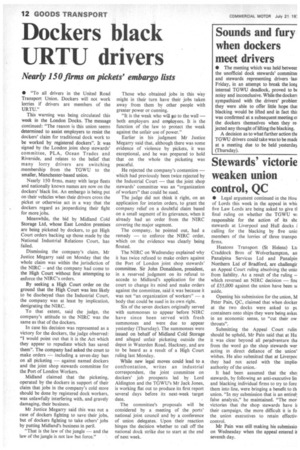Dockers black URTU drivers
Page 14

If you've noticed an error in this article please click here to report it so we can fix it.
Nearly 150 firms on pickets' embargo lists
• "To all drivers in the United Road Transport Union. Dockers will not work lorries if drivers are members of the URTU."
This warning was being circulated this week in the London Docks. The message continued: "The reason is this union seems determined to assist employers to resist the dockers' claim for traditional dock work to be worked by registered dockers". It was signed by the London joint shop stewards' committee, PLA, Ocean Trades and Riverside, and relates to the belief that many lorry drivers are switching membership from the TGWU to the smaller, Manchester-based union.
Nearly 150 firms, many with large fleets and nationally known names are now on the dockers' black list. An embargo is being put on their vehicles when their drivers cross the picket or otherwise act in a way that the dockers regard as jeopardizing their fight for more jobs.
Meanwhile, the bid by Midland Cold Storage Ltd, whose East London premises are being picketed by dockers, to get High Court orders backing up those made by the National Industrial Relations Court, has failed.
Dismissing the company's claim, Mr Justice Megarry said on Monday that the whole claim was within the jurisdiction of the NIRC '-and the company had come to the High Court without first attempting to enforce the NIRC's orders.
By seeking a High Court order on the ground that the High Court was less likely to be disobeyed than the Industrial Court, the company was at least by implication, denigrating the NIRC.
To that extent, said the judge, the company's attitude to the NIRC was the same as that of the dockers.
In case his decision was represented as a victory for the dockers, the judge observed: "I would point out that it is the Act which they appear to repudiate which has saved them". The company had asked the court to make orders — including a seven-day ban on all picketing — against named dockers and the joint shop stewards committee for the Port of London Workers.
Midland claimed that the picketing, operated by the dockers in support of their claim that jobs in the company's cold store should be done by registered dock workers, was unlawfully interfering with, and gravely damaging, their business.
Mr Justice Megarry said this was not a case of dockers fighting to save their jobs, but of dockers fighting to take others' jobs by putting Midland's business in peril.
"That is the law of the jungle — and the law of the jungle is not law but force." Those who obtained jobs in this way might in their turn have their jobs taken away from them by other people with greater power or cunning.
"It is the weak who will go to the wall — both employers and employees. It is the function of the law to protect the weak against the unfair use of power."
Earlier in his judgment Mr Justice Megarry said that, although there was some evidence of violence by pickets, it was exceptional, and he was prepared to hold that on the whole the picketing was peaceful.
He rejected the company's contention — which had previously been twice rejected by the Industrial Court — that the joint shop stewards' committee was an "organization of workers" that could be sued.
The judge did not think it right, on an application for interim orders, to grant the company relief on a doubtful claim based on a small segment of its grievance, when it already had an order from the NIRC covering the major segment.
The company, he pointed out, had a remedy — to enforce the NIRC order, which on the evidence was clearly being flouted.
The NIRC on Wednesday explained why it has twice refused to make orders against the Port of London joint shop stewards' committee. Sir John Donaldson, president, in a reserved judgment on its refusal to accede to Midland's application for the court to change its mind and make orders against the committee, said it was because it was not "an organization of workers" — a body that could be sued in its own right.
Six of the seven dockers originally served with summonses to appear before NIRC have since been served with fresh summonses and were due to appear yesterday (Thursday). The summonses were issued on behalf of Midland Cold Storage and alleged unfair picketing outside the depot in Waterden Road, Hackney, and are to be heard as a result of a High Court ruling last Monday.
While new legal moves could lead to a confrontation, writes an industrial correspondent, the joint committee on dockers' job prospects led by Lord Aldington and the TGWU's Mr Jack Jones, is working flat out to produce its first report several days before its next-week target date.
The committee's proposals will be considered by a meeting of the ports' national joint council and by a conference of union delegates. Upon their reaction hinges the decision whether to call off the national dock strike due to start at the end of next week.




























































































